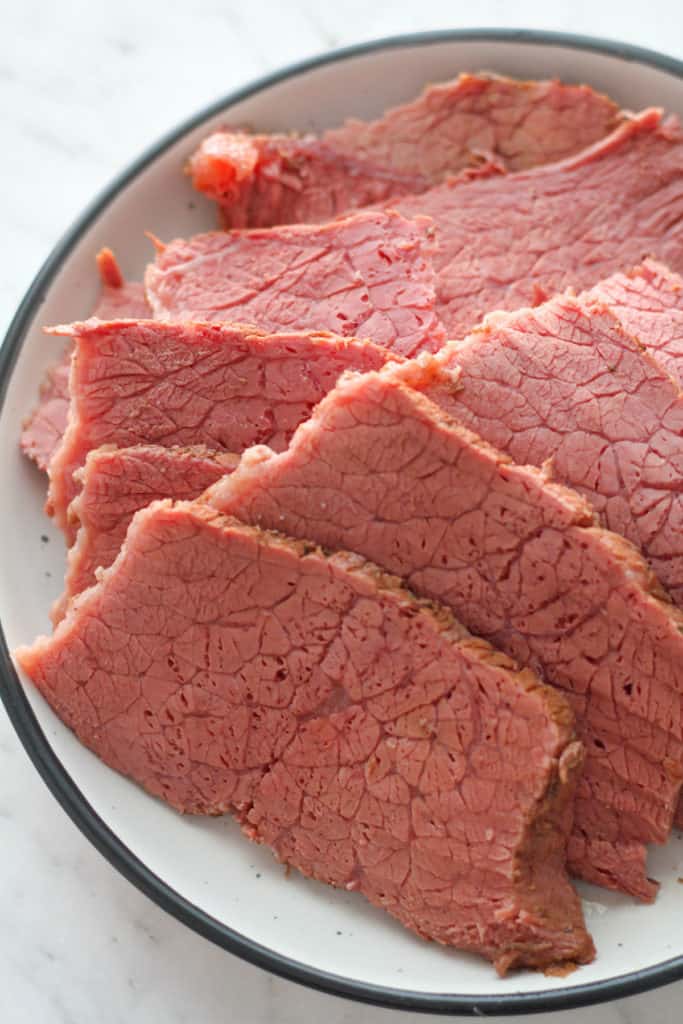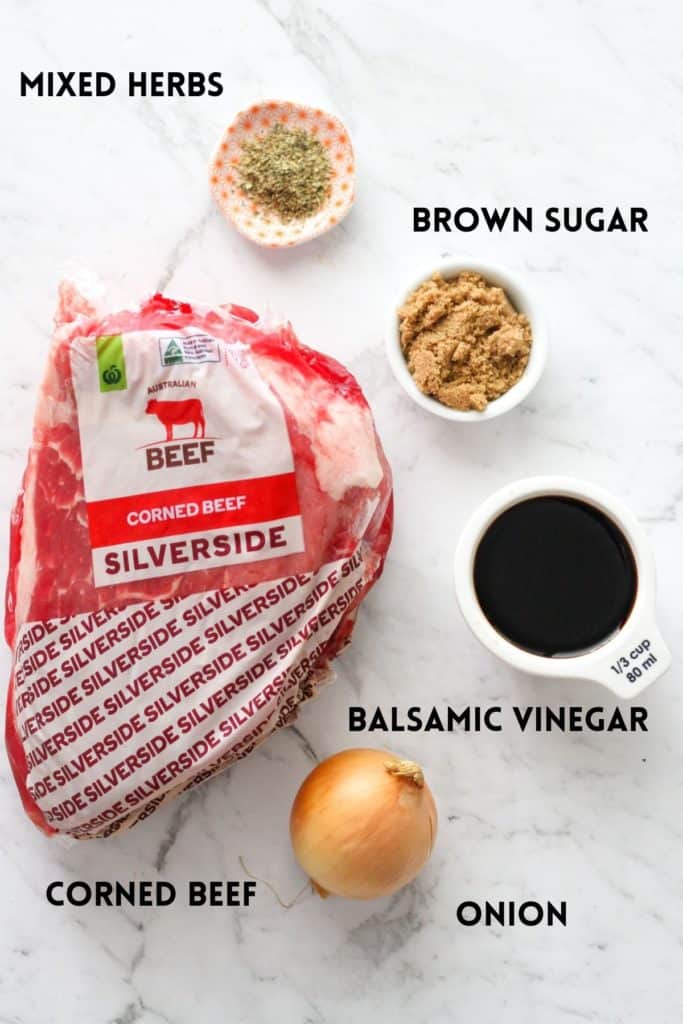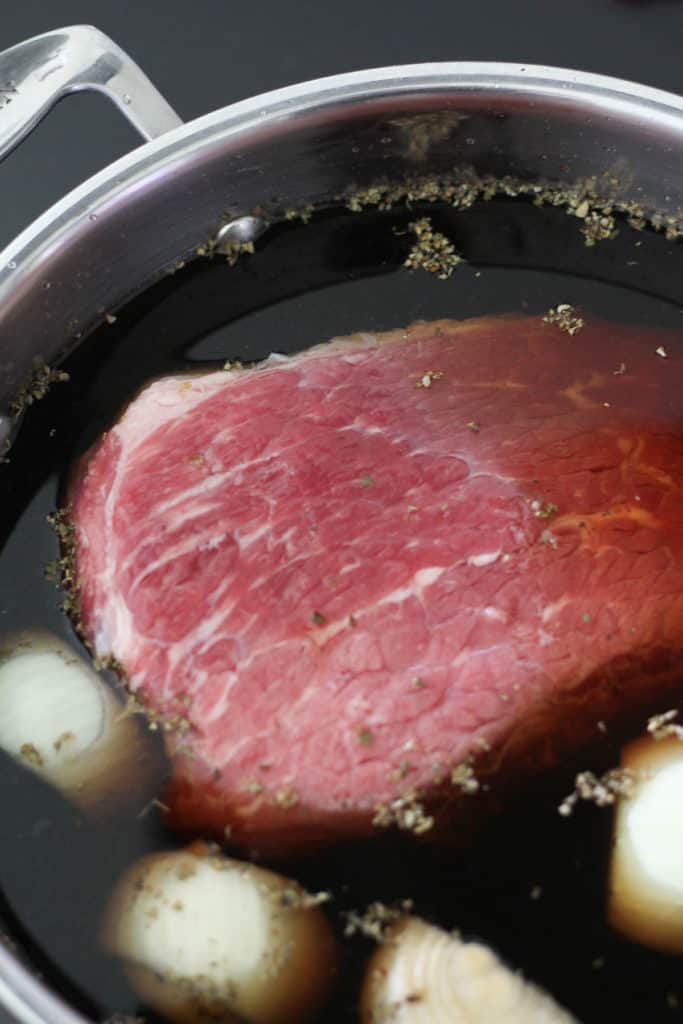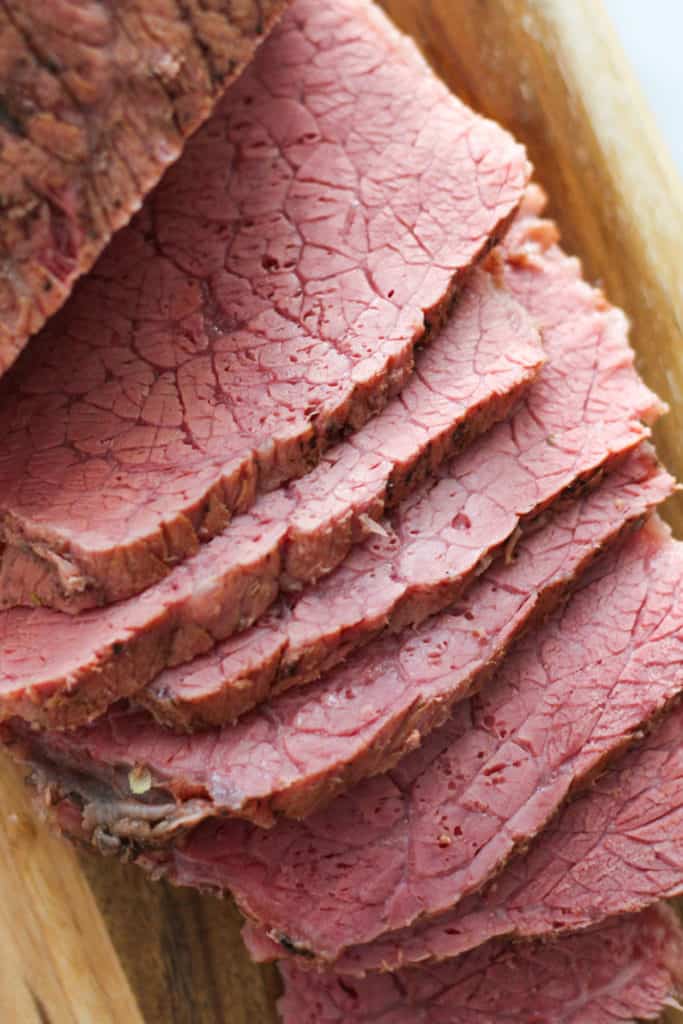Corned beef is a classic family-favourite that is perfect for a hearty weeknight dinner. Learn how to cook tender corned beef perfectly on the stovetop every time.
Corned beef is a timeless family favourite that is so easy to prepare with just a few ingredients. For this recipe the beef is simmered slowly on the stovetop for hours until it is mouthwateringly tender.
People in Australia often eat corned beef, which is also sometimes called corned meat, with mashed potatoes and vegetables. The simple white sauce that comes with it is also common, but my family has always served it with sour cream. You might not believe it will work, but don’t say anything until you give it a try!
I highly recommend using any leftovers you have after serving this to make Corned Beef Fritters. One of my absolute favourite meals.
Corned beef, a salt-cured brisket that’s simmered until tender, is a beloved staple across many cultures. The brining liquid traditionally contains vinegar, which helps tenderize the meat while adding a tangy flavor. However, corned beef can still turn out moist and delicious even without the vinegar. With smart ingredients and technique, you can make tasty corned beef minus the vinegar.
Why Vinegar is Traditionally Used for Corned Beef
But before we look at how to make corned beef without vinegar, it’s helpful to know why vinegar is usually added:
-
Tenderizing – Vinegar breaks down muscle fibers, resulting in a more tender finished brisket. The acetic acid in vinegar acts as a meat tenderizer.
-
Tangy flavor – Vinegar adds a bright acidic taste that balances the rich flavor of the beef. It gives a characteristic pickle-like zing.
-
Preserving – Vinegar is a natural preservative helping keep the brisket fresh longer when brining and cooking.
-
Safety – The acidic vinegar environment inhibits bacteria growth during curing and brining.
Knowing the purpose of the vinegar will make it easier to find suitable replacements to make tasty corned beef without it.
Alternative Ingredients for Pickling Without Vinegar
Even though vinegar is usually used as the pickling liquid for corned beef, there are many other things that can be used instead:
-
Lemon or lime juice – The citric acid helps tenderize the meat and provides bright, tangy notes.
-
Wine or verjus – The natural acids in wine or verjus break down collagen while lending fruity undertones.
-
Yogurt or buttermilk – Cultured dairy tenderizes brisket and gives a creamy tang.
-
Tomato juice – Provides mild acidity for pickling without an overt tomato flavor.
-
Fruit juices – Pineapple, orange and other juices offer tartness with natural sweetness.
-
Beer or whiskey – The alcohol helps extract flavors from spices while imparting unique taste.
With creativity, you can craft a custom vinegar-free brine that makes your corned beef special.
Step-By-Step Guide to Making Corned Beef Without Vinegar
Follow these steps for delicious homemade corned beef without a drop of vinegar:
1. Choose the Brining Ingredients
Select a liquid base such as broth, tomato juice or wine along with added seasonings. Pick any combination of peppercorns, bay leaves, cloves, allspice berries and other pickling spices to include.
2. Mix the Brine
Combine 2-3 quarts of your chosen liquid with 1/4 cup pickling spice mix and other flavorings like garlic, sugar or citrus zest in a large pot.
3. Submerge the Brisket
Place the 4-5 lb trimmed beef brisket in a container and pour the brine over to cover. Refrigerate for 5-10 days. Turn the brisket daily.
4. Rinse and Drain the Brisket
Once cured, remove the brisket from the brine. Rinse thoroughly under cool water and pat dry. Discard the used brine.
5. Simmer in Fresh Liquid
Put brisket in a pot and add fresh liquid like broth or water with aromatics. Simmer covered on low until fork tender – about 3 hours.
6. Let Rest Before Slicing
Turn off heat and leave the brisket immersed in the liquid for 30 minutes before slicing across the grain.
With the right brine and low-slow cooking, brisket comes out perfectly tender and full of flavor without vinegar!
Choosing the Best Cut of Beef for Vinegar-Free Corned Beef
While any cut of beef can be corn cured, the brisket provides ideal results when making corned beef without vinegar:
-
Well-marbled – The fat keeps the lean meat moist and flavorful after the extended cooking.
-
Large muscle – This thick, substantial cut can handle the lengthy brining and simmering.
-
Collagen-rich – The connective tissue melts into tender gelatin without vinegar’s collagen-breaking acidity.
-
Textured grain – Across-the-grain slicing gives a pleasant chewy texture.
Pick a high-quality brisket with good marbling for maximum juiciness and flavor sans vinegar.
Helpful Tips for Getting Great Results from Vinegar-Free Corned Beef
Follow these useful tips when pursuing the vinegary-free corned beef route:
-
Choose fresh spices for the brine to maximize flavor without vinegar.
-
Use a sweet addition like brown sugar or maple syrup to balance the brine.
-
Add citrus peels or pineapple cores for natural tenderizing enzymes.
-
Rinse the brisket well before cooking to remove excess surface salt.
-
Gently simmer on low heat and add liquid if needed to prevent drying out.
-
Check for doneness by piercing with a fork rather than relying on time.
-
Let the brisket rest in the cooking liquid for 30 minutes before serving for juicy results.
With smart preparation and cooking methods, your vinegar-free corned beef will be fork-tender and full of old-fashioned flavor!
Serving Suggestions for Corned Beef Sans Vinegar
Once your vinegar-free corned beef is ready, transform it into crave-worthy dishes:
-
Piled high on rye bread for classic deli-style Reuben sandwiches
-
Combined with steamed cabbage, onions and potatoes for traditional Irish-American boiled dinner
-
Diced up in hearty hash with potatoes, bell peppers and onions
-
Featured in a creamy corned beef chowder with potatoes, celery and herbs
-
Served over fresh greens for an easy yet satisfying salad
-
Stuffed into empanadas or hand pies for savory, portable finger food
-
Folded into omelets or scrambled eggs for a hearty breakfast
However you serve your homemade corned beef, the flavors will shine without the need for vinegar brining!
Frequently Asked Questions About Making Corned Beef Without Vinegar
What’s the best cooking method for vinegar-free corned beef?
Low and slow moist heat methods like braising, stewing or slow cooking work best to keep the meat tender. Simmer gently in broth or water until a fork pierces the meat easily.
How can I tell when it’s done without the vinegar?
Don’t rely on cook times. Use a meat thermometer and cook until it reaches 190-205°F internally. Check for fork tenderness too.
What about food safety without the vinegar’s acidity?
Use very fresh ingredients and keep refrigerated while brining and cooking. Discard any brisket that smells or looks off. Reheat fully.
Should I marinate it in something acidic before cooking?
Yes, briefly marinating in a tart liquid like lemon juice, wine or tomato juice before cooking can help tenderize.
Can I use something acidic in the simmering liquid?
Yes! Adding a bit of tomato juice, apple cider vinegar or wine to the cooking liquid provides some brightness.
Enjoy the Full, Rich Flavors of Corned Beef Without Vinegar
With the right choice of ingredients and hands-on care, you can savor fabulously flavored corned beef without depending on vinegar for brining. Arm yourself with knowledge of alternatives that can tenderize and add flavor, and you’ll feel confident omitting the vinegar. For brisket that’s irresistibly tender with a wonderful old-fashioned taste, try your hand at homemade vinegar-free corned beef.

WHAT TO SERVE WITH CORNED BEEF?
The classic pairing is mashed potato and cabbage. In Australia its common to serve the beef with white sauce, but my family always served it with sour cream. Dont knock it until you try it!
- This classic corned beef recipe calls for corned beef that has already been cured and is sold in a vacuum-sealed bag at most grocery stores. Just make sure to rinse it off before cooking because the brining liquid can make it too salty.
- Keep your cooking temperature at a low simmer. A few little bubbles here Boiling makes corned beef dry and stringy.
- During cooking, if you see any gray foam rising to the top, use a slotted spoon to take it off and throw it away.
- When corned beef is done, a fork should easily go through the middle of the meat.
- Slice the corned beef against the grain.
- If you don’t want to eat right away, take the pot off the heat and let the corned beef rest in the cooking liquid.

WHAT IS CORNED BEEF
It may sound strange, but corned beef has nothing to do with corn. The British came up with the term “corned beef” in the 1700s. At that time, all grains were called corn. When the beef was cured, it was covered in big chunks of salt that looked like oats or barley, which is why it was called corned.
A piece of beef brisket that has been cured in salt is what corned beef is today. It is also sometimes called corned meat. Most grocery stores sell corned beef that hasn’t been cooked yet and is sealed in a vacuum-sealed bag. This is what I use for this traditional corned beef recipe.

A tasty corned beef can be made with just a few simple ingredients (the full recipe is at the bottom of this page with measurements).
- Corned Beef / Silverside
- White or malt vinegar can be used instead of balsamic vinegar, but I like balsamic vinegar better.
- Brown / Yellow Onion
- Brown Sugar
- Mixed Herbs
Remove the corned beef from its packaging and rinse in cold water to remove surface brine. This helps prevent it from being overly salty.
Place the beef, ⅓ cup of balsamic vinegar, 1 onion, 1. Put 5 tablespoons of brown sugar and 1 tablespoon of mixed herbs in a large pot or saucepan. Add enough cold water to cover the beef.

Bring to the boil then reduce heat immediately to a simmer. Keep simmering slowly on low heat with the lid partially on for another two hours, or until a fork or skewer can easily go through the middle of the beef.
When youre ready to serve, be sure to slice the corned beef against the grain.

